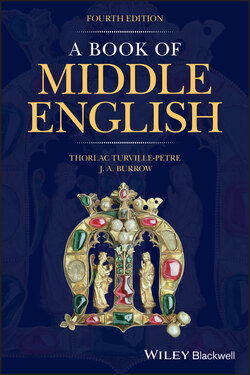Читать книгу A Book of Middle English - J. A. Burrow - Страница 99
8.4.3 Some Nouns and Verbs
ОглавлениеMany of the words examined above are adjectives, which are particularly prone to semantic change, because they take on the colour of the nouns they qualify. Nouns to pay attention to are, for example, mete, ‘food’ (7b/51, 9/45, 474); daunger, primarily ‘power’, but with senses ranging from ‘reserve’ (17/384) to ‘state of longing’ (10/250); sentence, basically ‘opinion’, but with senses including ‘decision, judgement’ (16/530), ‘teaching’ (16/35), ‘subject matter’ (18b/111), and ‘meaning’ (16/126); wit, ranging in sense from ‘wisdom’ (8/129), ‘intelligence’ (12/55), ‘advice’ (7b/55), to ‘mind, thought’ (8/74). Among verbs, bowe commonly means ‘go, come’, lymp is not ‘limp’ but ‘happen’ (8/265), sterve not ‘starve’ but ‘die’ (16/420). Thynk means ‘seem’, not ‘think’ which is thenk; it is most often used in impersonal constructions: me thynkes, ‘it seems to me’ (11/259). For more impersonal verbs, such as like and list, see 5.6.8. If in any doubt about the signification of a word, the advice must be to check the footnote, look in the glossary, and for a fuller appreciation of semantic range and connotations, follow it up in OED and MED.
